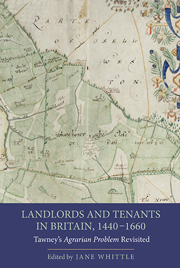Book contents
- Frontmatter
- Contents
- List of Figures
- List of Tables
- Abbreviations
- List of Contributors
- Acknowledgements
- Foreword
- Introduction: Tawney's Agrarian Problem Revisited
- 1 The Agrarian Problem, 1440–1520
- 2 Common Law and Manor Courts: Lords, Copyholders and Doing Justice in Early Tudor England
- 3 Negotiating Enclosure in Sixteenth-Century Yorkshire: The South Cave Dispute, 1530–1536
- 4 The Politics of Enclosure in Elizabethan England: Contesting ‘Neighbourship’ in Chinley (Derbyshire)
- 5 The Loss of Athelstan's Gift: The Politics of Popular Memory in Malmesbury, 1607–1633
- 6 In Search of the Scottish Agrarian Problem
- 7 The Transfer to Leasehold on Durham Cathedral Estate, 1541–1626
- 8 The Financial Rewards of Winning the Battle for Secure Customary Tenure
- 9 Risks and Rewards in Wasteland Enclosure: Lowland Lancashire c.1500–1650
- 10 Improving Landlords or Villains of the Piece? A Case Study of Early Seventeenth-Century Norfolk
- 11 The Agrarian Problem in Revolutionary England
- 12 Agrarian Capitalism and Merchant Capitalism: Tawney, Dobb, Brenner and Beyond
- Conclusions
- Select Bibliography
- Index
4 - The Politics of Enclosure in Elizabethan England: Contesting ‘Neighbourship’ in Chinley (Derbyshire)
Published online by Cambridge University Press: 05 September 2013
- Frontmatter
- Contents
- List of Figures
- List of Tables
- Abbreviations
- List of Contributors
- Acknowledgements
- Foreword
- Introduction: Tawney's Agrarian Problem Revisited
- 1 The Agrarian Problem, 1440–1520
- 2 Common Law and Manor Courts: Lords, Copyholders and Doing Justice in Early Tudor England
- 3 Negotiating Enclosure in Sixteenth-Century Yorkshire: The South Cave Dispute, 1530–1536
- 4 The Politics of Enclosure in Elizabethan England: Contesting ‘Neighbourship’ in Chinley (Derbyshire)
- 5 The Loss of Athelstan's Gift: The Politics of Popular Memory in Malmesbury, 1607–1633
- 6 In Search of the Scottish Agrarian Problem
- 7 The Transfer to Leasehold on Durham Cathedral Estate, 1541–1626
- 8 The Financial Rewards of Winning the Battle for Secure Customary Tenure
- 9 Risks and Rewards in Wasteland Enclosure: Lowland Lancashire c.1500–1650
- 10 Improving Landlords or Villains of the Piece? A Case Study of Early Seventeenth-Century Norfolk
- 11 The Agrarian Problem in Revolutionary England
- 12 Agrarian Capitalism and Merchant Capitalism: Tawney, Dobb, Brenner and Beyond
- Conclusions
- Select Bibliography
- Index
Summary
Among the numerous examples of ‘aggressive landlordism’ that R. H. Tawney cited in The Agrarian Problem are the nefarious activities of Godfrey Bradshaw in Chinley (Derbyshire) in 1569, which had first been brought to light in an article published in the Derbyshire Archaeological Journal in 1899. Tawney's discussion of the unrest provoked by Bradshaw's estate management is based exclusively on the Star Chamber interrogatories issued on Bradshaw's behalf, sources which, by their very nature, present a partisan and adversarial version of the episodes. Tawney nonetheless assumed the veracity of the narrative implied by Bradshaw's attorneys and explained the story as a series of attempts by dispossessed inhabitants to regain ‘the rights of pasture which they had hitherto enjoyed’. He also drew attention to a particularly tantalising aspect of the alleged events at Chinley: local men were said to have conferred with the mysterious ‘Master Bircles of the Countye of Chester’ and consulted ‘bookes of prophesie’ – the latter far more politically dangerous than mere enclosure rioting. Keith Thomas further explored this aspect of the events at Chinley, identifying ‘Master Bircles’ as John Birtles, who in about 1584 was one of those involved in an alleged conspiracy against the queen, he being found in possession of ‘a certain old book of prophecy … [which] sheweth when this realm of England shall be subverted’.
- Type
- Chapter
- Information
- Landlords and Tenants in Britain, 1440-1660Tawney's 'Agrarian Problem' Revisited, pp. 67 - 84Publisher: Boydell & BrewerPrint publication year: 2013



